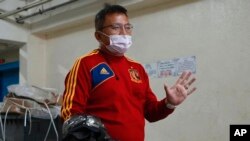A livestream published early Wednesday morning alerted the world to another raid on a pro-democracy news outlet in Hong Kong.
Hong Kong national security police, armed with a search warrant, were pressing to enter the home of Stand News journalist Ronson Chan.
Officers told Chan they were there as part of an investigation related to charges of conspiring to publish seditious content and told the journalist to stop recording.
Later in the day, authorities announced that six people had been arrested, and Stand News announced via Facebook that the news website would “immediately cease to operate.”
Chan, deputy assignment editor at Stand News and chair of the Hong Kong Journalists Association, described the closure as a “sad day” when he spoke with reporters. He also posted to Facebook: “Reluctant but need to say goodbye. Thanks to Stand News again.”
Chan was not among the six staff members facing charges of conspiracy to publish seditious publications, but he was said to be “assisting with police investigations.”
When authorities entered Chan’s home, they confiscated the journalist’s computer, phone, press pass and bank records, he later told reporters.
Around 200 officers also raided the newspaper’s offices, according to a government press release.
Steve Li, head of the police national security department, told reporters that Stand News had published news and commentary inciting hatred against authorities, Reuters reported.
Li said police seized assets worth HK$61 million ($7.82 million) and did not rule out further arrests. "We are not targeting reporters. We are targeting national security offenses," Li said.
Hong Kong Chief Secretary John Lee said he supported the efforts of the authorities.
"Anybody who attempts to make use of media work as a tool to pursue their political purpose or other interests countering the law, particularly offenses that endanger national security, they are the evil element that damage press freedom," Lee said.
Founded in 2014, Stand News was shortlisted this year for the Reporters Without Borders Independence award. The media watchdog cited the outlet’s reporting on “crucial political and social developments in the territory, and … in-depth coverage of government policy and all trials related to the National Security Law.”
During anti-government protests in the city in 2019, several of its reporters were injured, including journalist-turned-activist Gwyneth Ho. She was one of 47 people accused of subversion under the national security law in February.
More recently, the news site has come under pressure, including from pro-Beijing state-run media, which alleged that its reports incited terrorism.
In June, Stand News announced it had removed some commentaries, opinions, blogs and reader contributions of its own accord. At the same time, six board members resigned, including former Stand News board member Denise Ho, legislator Margaret Ng, and Tat-chi Chow, who were among the six arrested Wednesday.
The other three detained were chief editor Patrick Lam, former chief editor Chung Pui-Kuen and former board member Christine Fang.
Hours before the police raids, editor Chan spoke at the Hong Kong Journalists Association annual dinner about the challenges for the city’s media.
The HKJA said in a statement that it was following closely the case against its chairperson and Stand News.
“[HKJA] is deeply concerned that the police have repeatedly arrested senior members of the media and searched the offices of news organizations containing large quantities of journalistic materials within a year. HKJA urges the government to protect press freedom in accordance with the Basic Law,” the association said.
The raids and imminent closure of Stand News came just six months after pro-democracy news outlet Apple Daily folded. Authorities froze assets and arrested several of the outlet’s executives, including founder Jimmy Lai, under the national security law.
Alvin Chan, a freelance journalist for Stand News who had worked at Apple Daily, told VOA the situation was a “nightmare.”
“Actually, fear is not the emotion, perhaps anger. Again, we did nothing wrong, and I believe journalists in Stand News did nothing wrong, too,” Alvin Chan said.
“The authorities seem to have a drama script, which is what happened in 2019 was incited by the media, including Apple Daily and Stand News,” Alvin Chan said, referring to the mass protests that year.
Unlike Apple Daily, those arrested at Stand News are facing charges of sedition rather than crimes under the national security law.
However, recent court judgments have enabled authorities to use powers under the national security law to deploy rarely used colonial-era laws covering sedition, Reuters reported.
The United Nations, rights groups and journalist organizations criticized Wednesday’s raid, saying it would damage Hong Kong’s press freedom record.
The U.N. rights office said it was "alarmed by the continued crackdown on civic space" in Hong Kong.
"Hong Kong has a legal obligation to respect the rights to freedom of information, expression and association, as well as to guarantee due process," it said in a statement to Reuters. "We are witnessing an extremely rapid closing of the civic space and outlets for Hong Kong’s civil society to speak and express themselves freely."
Hong Kong Watch, a watchdog group in Britain, described the arrests as “nothing short of an all-out assault on the freedom of the press in Hong Kong.” And the city’s Foreign Correspondents Club said that while it was not commenting on the legality of the actions, “[they] are a further blow to press freedom in Hong Kong and will continue to chill the media environment in the city following a difficult year for the city’s news outlets.”
Concerns for Hong Kong’s media environment have been raised since Beijing imposed the national security law in June 2020.
In an interview with VOA this month, Ronson Chan said the “red lines” for Hong Kong media had made 2021 the “saddest year.”
“We never can get back — Hong Kong has changed,” he said, predicting that the situation would get worse. “Next year will not be easy. We still have a very critical situation.”
Some information for this article came from Reuters.




